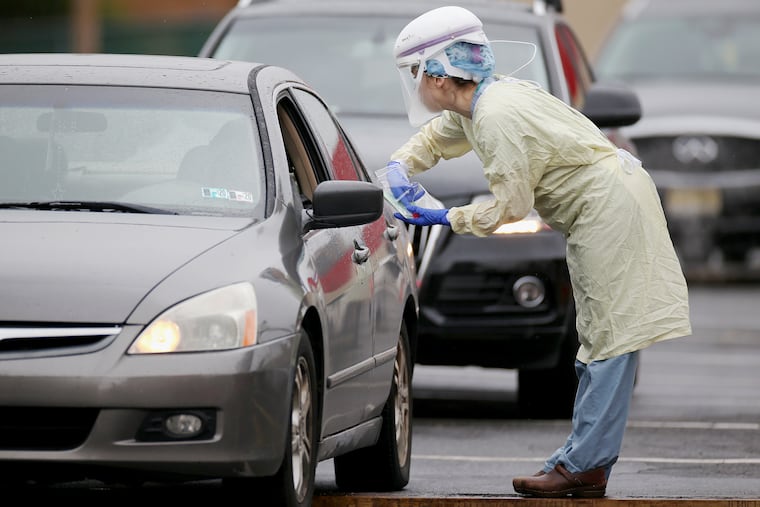Penn, Main Line Health offer ‘drive-through’ coronavirus testing. But taking a nasal swab is just the first step.
When is a "test" not a test? When it's a step in the process of diagnosing coronavirus infection.

Penn Medicine and Main Line Health on Monday became the latest health systems to announce “drive-through testing” for coronavirus infection among people who have a referral from their doctor.
The number of drive-through sites is growing in an effort to make testing safer, faster, and more available.
While that’s good, calling it “testing” is misleading, and may add to confusion about the rather cumbersome process for getting a diagnosis of the respiratory illness. The fact is that doctors, clinics and even most hospitals can’t do the test. Their role is to collect patients’ nasal and throat swabs to ship to a high-complexity lab where molecular analysis is done to look for coronavirus DNA.
Penn is a little different because this week it began doing the molecular analysis in its own high-complexity lab, using kits created with a commercial company, according to chief medical officer P.J. Brennan. That gives Penn the ability to bypass or supplement the limited testing offered through the Pennsylvania Health Department’s public health lab.
To get patients’ samples, Penn has set up collection sites in parking lots at two facilities, one in West Philadelphia and the other in Radnor. Health-care workers wearing protective equipment including face masks and gloves will take nasal or throat swabs or both, as patients with symptoms such as fever and cough remain in their cars.
The drive-through service and the test is being offered only to patients referred by their Penn doctors; it is free, even to uninsured patients, a Penn spokesperson said.
Main Line Health opened drive-through testing centers in Newtown Square and Radnor for patients who have been referred for a test by a Main Line doctor. Tests are being processed by Quest, and results are typically available in three to five days, a Main Line Health spokesperson said.
Patients who do not have a referral from their doctor will not be able to get tested at the Main Line locations. People who are experiencing respiratory illness symptoms and think they should be tested for coronavirus should contact their primary care doctor.
Jefferson Health has opened a mobile testing site in Abington and is in the process of setting up testing sites in Center City, Northeast Philadelphia and New Jersey. Only patients who have a doctor’s referral will be able to get tested.
Here is more background on testing — and the obstacles to it.
Collecting specimens
The U.S. Centers for Disease Control and Prevention advises that a patient with symptoms such as fever, cough, and trouble breathing should alert a doctor’s office. When the patient arrives, he or she should be given a face mask and put in room away from other patients, and the health-care worker taking the swabs should wear a "respirator” face mask, known as N95, and other protective gear — a gown, gloves, and eye covering.
The obstacles. Many patients show up at a doctor’s office without calling ahead, or they go straight to an emergency room. (The ER may be the only option for some uninsured patients.) Many doctor’s offices and urgent care clinics don’t have, or have run out of, N95 masks and protective equipment, so they are refusing to take samples. Drive-by or dedicated specimen collection stations may improve the situation, but are only beginning to be an option. Telemedicine services such as Teledoc can help evaluate patients’ symptoms and possible virus exposure, but obviously sample collection can’t be done through a telephone or computer.
Ordering a test
Until now, the CDC and state public health labs were basically the only test facilities approved by the Food and Drug Administration to do the laborious, exacting molecular test for the new coronavirus. But in the past week or so, numerous academic and commercial labs (including LabCorp, Quest, Roche, and Thermo Fisher) have been approved to test for the virus, so doctors can order a test without state permission.
The obstacles. The government’s initial slow response to the pandemic has created a Catch-22, with doctors unable to order the testing that is vital to detecting and controlling disease spread. Government lab tests have been mostly limited to people with known sources of infection — travel or direct contact with a confirmed case. Health-care providers who call their state lab (a time-gobbling task) to order a test for a patient are often told that “the patient doesn’t meet the criteria,” even though the CDC has urged doctors to “use their judgment” about whom to test. Doctors can now order a test without state permission directly from some of the commercial labs. But they still have to collect and ship patients’ specimens because the commercial tests are not done on the spot, unlike the rapid flu test. Even commercial labs have limited capacity at this point, and turnaround time for results can be lengthy – three or four days.
One obstacle that may have fallen. Big health insurance companies and Medicare/Medicaid have said they will cover the cost of testing, and numerous states have mandated coverage with no co-pays or deductibles.
Staff writer Sarah Gantz contributed to this article.